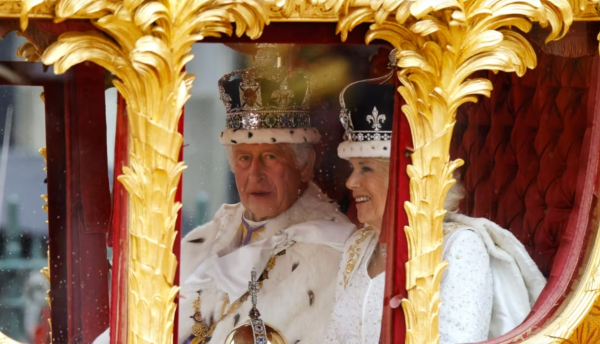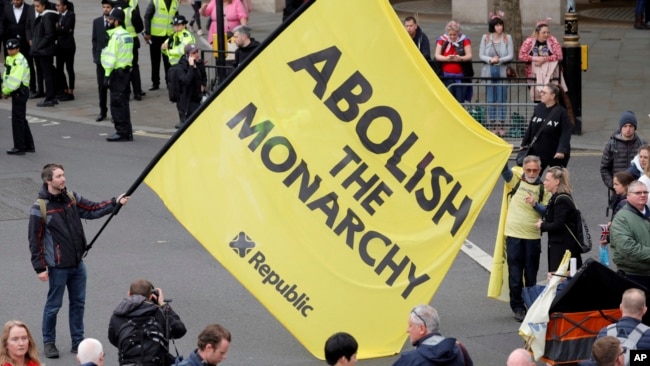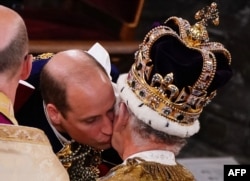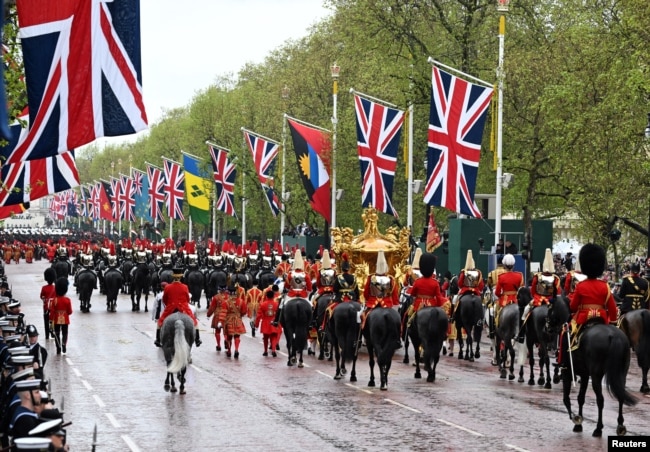Britain’s King Charles III Crowned in Historic Ceremony

LONDON — Hundreds of thousands of people lined the streets of London on Saturday to witness the coronation of Britain’s King Charles III in a ceremony of pageantry and tradition watched by millions around the world on television and online.
Ninety heads of state, including kings and queens from around the world, attended the ceremony at Westminster Abbey. Some 203 countries were represented in the congregation, according to Buckingham Palace.
Charles, now 74 years old, became heir to the British throne in 1952 at the age of just three, when his mother Queen Elizabeth II ascended the throne and was the longest-serving British heir-apparent. Charles officially became king upon her death on September 8 last year.
Charles’ coronation marks a new chapter for an ancient institution.
Historic procession
King Charles III and Queen Consort Camilla were taken by horse-drawn carriage from Buckingham Palace to Westminster Abbey on Saturday morning.
Despite occasionally heavy rain, hundreds of thousands of people lined the route of the procession along The Mall and through Whitehall, past the Houses of Parliament, just as they had done eight months ago for the funeral of Queen Elizabeth II.
A small number of protesters briefly drowned out the cheers. Police made several arrests, including members of the anti-monarchy group Republic, and the environmental protest group Just Stop Oil. There was no disruption to the procession.
Inside Westminster Abbey, the congregation of 2,200 people included members of the royal family, foreign kings and queens, presidents and prime ministers, alongside members of the public invited by the king for their charity work. It was a fraction of the 8,000-strong congregation that witnessed Queen Elizabeth’s coronation in 1953, reflecting Charles’ desire for what the palace terms a “slimmed-down” monarchy.
Prince Harry, Charles’ youngest son, attended the ceremony alone amid continued strained relations following allegations of racism against his wife Meghan Markle and their son, Prince Archie, which the royal family denies.
Vivid pageantry
However, this was a day not for family drama — but for uniquely British pomp and pageantry deeply imbued with Christian faith. Some of the coronation rituals remain unchanged for more than 1,000 years. The first British monarch to be crowned at Westminster Abbey was William the Conqueror in 1066.
Placing his hand on the Bible, Charles proclaimed his allegiance to God: “In His name, and after His example, I come not to be served, but to serve,” he said.
Justin Welby, the Archbishop of Canterbury, led the service. He asked of King Charles: “The coronation oath has stood for centuries and is enshrined in law. Are you willing to take the oath?”
“I am willing,” the king replied.
Multi-faith assembly
For the first time, female bishops took part in the service, alongside leaders of other faiths.
In a touching moment, Charles’ son Prince William pledged his allegiance to the king, with the words: “I, William, Prince of Wales, pledge my loyalty to you and faith and truth I will bear unto you as your liege man of life and limb. So help me God.” He then kissed his father on the cheek.
Archbishop Welby then invited all those watching the service, within the abbey and on television, to pledge their allegiance to the king.
Crowning moment
As the crown was placed upon Charles’ head, trumpets sounded throughout the abbey. Across Britain, gun salutes marked the moment — a profound moment in the history of the nation.
The archbishop then placed a crown on the head of Charles’ wife, Queen Consort Camilla.
For those watching on giant screens in the streets and parks of central London, it was an experience to cherish.
“A moment once in the life, you know. It’s magical, it’s such an incredible event,” said Aurelien, a visitor from France, who did not give his surname.
Peggy Jane Lavery, a retired teacher from the United States, recalled the last coronation in 1953.
“I’m excited that I can be a part of a coronation. When I was a young girl, I was able to watch Queen Elizabeth [II] on television in Hartford, Connecticut, at a friend’s house because we had no TV. So, I’m thrilled to be here to see the coronation in person,” she told Reuters.
Buckingham Palace
At the end of the two-hour service, King Charles and Queen Camilla returned to Buckingham Palace in the gold state coach, which was built in 1762 and has been used in every coronation since 1831.
A huge entourage of military personnel followed, escorting another horse-drawn coach carrying William and Catherine, the Prince and Princess of Wales, and their three children.
Above a sea of British flags, the royal family gathered on the balcony of the palace to greet an adoring crowd. A flypast including helicopters from the Royal Air Force and the Red Arrows.
Future challenges
The new king and queen face undoubted challenges as they try to build on the deep legacy of Elizabeth II. They must try to keep the monarchy relevant to modern British society with an increasingly skeptical younger generation.
Charles has spoken of the need to investigate the monarchy’s role in Britain’s often brutal colonial past, and its link to the transatlantic slave trade. He must try to modernize an institution that is being strained by very public family feuds.
The king has voiced determination to take on those challenges: to lead an evolving monarchy that remains steeped in colorful tradition.


